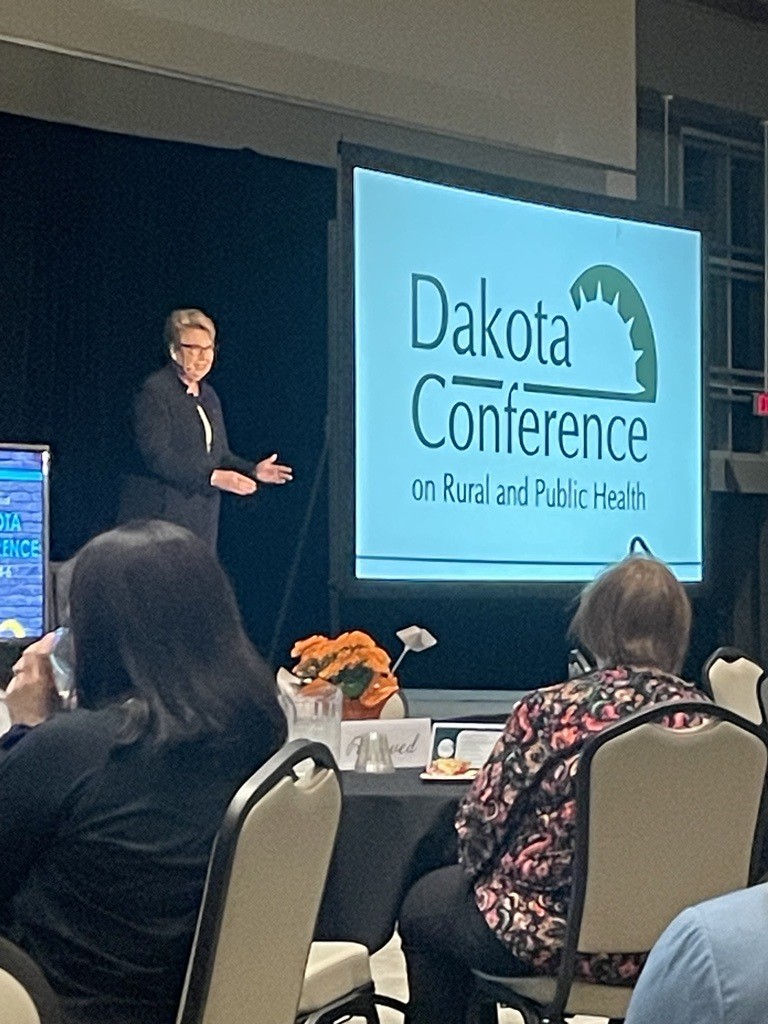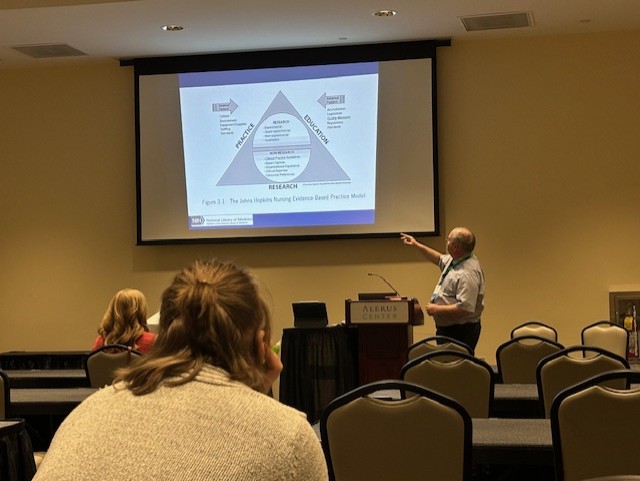Funding Recipient Spotlight: Professional Development Grants for the Dakota Conference on Rural and Public Health
Posted by liaison on June 25th, 2024
Posted in: Funding

This is a guest post written by Janet Anderson and Sara Westall. They used NNLM Region 4 professional development funds to attend the Dakota Conference on Rural and Public Health in Grand Forks, North Dakota earlier this month.
Why were you interested in this particular conference?
- Janet: I wanted to attend this conference to hear from experts in the medical field who could speak to the needs of North Dakotans. North Dakota is a very rural state which provides unique challenges to the students, faculty, and employees in healthcare, so I hoped to learn how to better serve and provide support to these populations. I also expected to learn about trends and questions facing rural and public health providers to help me stay on top of relevant issues.
- Sara: I was interested in attending the Dakota Conference on Rural and Public Health because I grew up in Rural North Dakota and have family members who use and work at the healthcare facilities that were represented at this conference, and I also wanted to network with faculty that I collaborate with in my role at UND.
What skills or knowledge did you hope to gain by attending?
- Janet: I hoped to network with providers who work with various specialties to understand the needs of rural healthcare providers. Additionally, I wanted to obtain information regarding what medical students and residents should expect when entering this field. Finally, I hoped to advocate for the value of librarians in the medical and health sciences field by making others aware of reliable information tools and the importance of having well-trained information experts working alongside healthcare providers.
- Sara: By attending, I was hoping to better understand what shortages were occurring in the healthcare field in North Dakota, but also how they were being addressed or researched. I also wanted to learn more about what healthcare issues North Dakotans were facing, such as increase in types of cancer, critical care access, unique addiction issues, and how Alzheimer’s Disease is becoming a public health crisis.
What were your favorite sessions and why?
- Janet: I found “Value Based Practice” very interesting as I see it as a parallel to evidence-based practice. This was reiterated by the presenters who said that before providers can become completely patient-focused, they must have data to know what patients need and value. This session discussed the importance of equity and community presence and emphasized that patients would rather pay for QUAILITY service rather than “just service.”In addition, David Brown’s presentation on “Censorship and Its Impact on Public Health” was very eye-opening. Coming from a
 public library background, I am very familiar with the issues facing public and school libraries regarding book challenges, but I hadn’t considered how this censorship movement could impact public health. In addition to David’s information, it was alarming to hear others in attendance discuss ways in which governing bodies were trying to impede public health campaigns and even what types of vaccinations community members could receive.
public library background, I am very familiar with the issues facing public and school libraries regarding book challenges, but I hadn’t considered how this censorship movement could impact public health. In addition to David’s information, it was alarming to hear others in attendance discuss ways in which governing bodies were trying to impede public health campaigns and even what types of vaccinations community members could receive.
- Sara: Many of the sessions were eye-opening, but I would have to say that the presentation “Alzheimer’s Disease-A Public Health Crisis, really made me stop in my tracks because of the alarming statistics. I had no clue there was such a shortage of Geriatricians, and while I knew there was a shortage of other healthcare workers, the demand is only going to increase. This led me to really think about more research in this area and to have a conversation with a faculty member in the Geriatrics department that I liaison with.
Any noteworthy trends in the field you feel Region 4 members might be interested in reading about?
- Janet: I don’t know that this is a trend, but the rates of alcohol abuse in our state were very alarming and I think this is something many rural states may struggle with. Libraries could assist in this by compiling information on impacts of alcohol abuse as well as treatments.As most people know, problems recruiting and maintaining staff is also a trend many healthcare facilities are facing so it was interesting for Sara and myself to attend a panel discussion on immigrant staffing. We were surprised to learn how difficult it is for qualified individuals from other countries to obtain authorization to work in the United States.
Do you have any other thoughts or information you’d like to share?
- Janet: Some take-aways from the various keynote and panel discussions include:
- Courage is a muscle that needs to be used regularly – it takes courage to speak up for others and seek positive change.
- Be present in your job – interact with employees and “catch” people doing good things.
- Don’t fall into the trap of “US versus THEM” and instead focus on what your purpose is, make positive thinking a habit, and choose gratitude whenever possible.
- In order to be resilient, people need: rest, uplifting emotion, and motivation.
- Every meeting should have meaningful information and meaningful feedback to be valuable.
- Align your work with when you have the most energy and consider even scheduling “worry time” so it doesn’t take up so much time during your day.
- Ask yourself: “Will it matter in 5 years?” when you are consumed by worry.
- Sara: I appreciated the opportunity with funding help from Region 4 to attend this conference!
——————————————-
If you are interested in obtaining funding for professional development, we are currently accepting applications for Year 4. Applications accepted and awarded on a rolling basis until February 16, 2025 at 5:00 pm MT or when the funds are depleted.
Please reach out to your state’s point of contact with any questions you may have.


 public library background, I am very familiar with the issues facing public and school libraries regarding book challenges, but I hadn’t considered how this censorship movement could impact public health. In addition to David’s information, it was alarming to hear others in attendance discuss ways in which governing bodies were trying to impede public health campaigns and even what types of vaccinations community members could receive.
public library background, I am very familiar with the issues facing public and school libraries regarding book challenges, but I hadn’t considered how this censorship movement could impact public health. In addition to David’s information, it was alarming to hear others in attendance discuss ways in which governing bodies were trying to impede public health campaigns and even what types of vaccinations community members could receive.